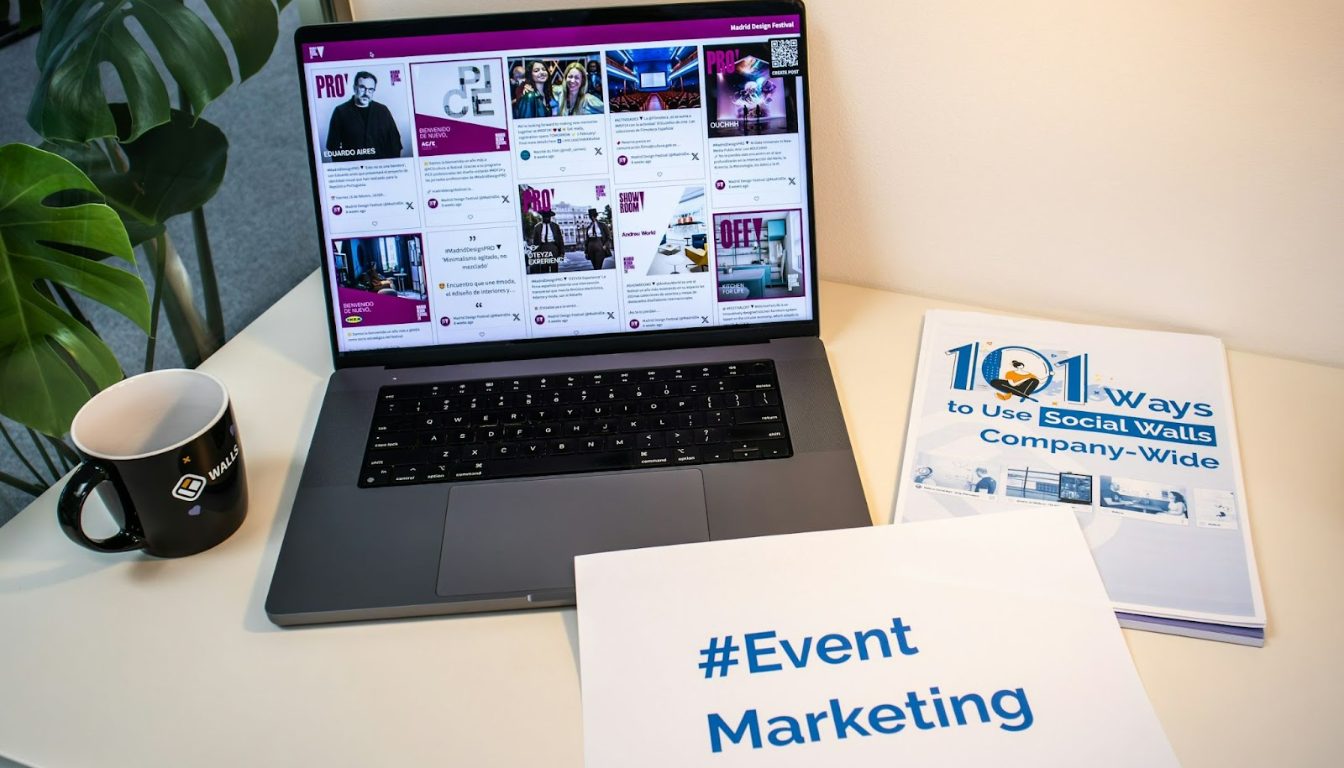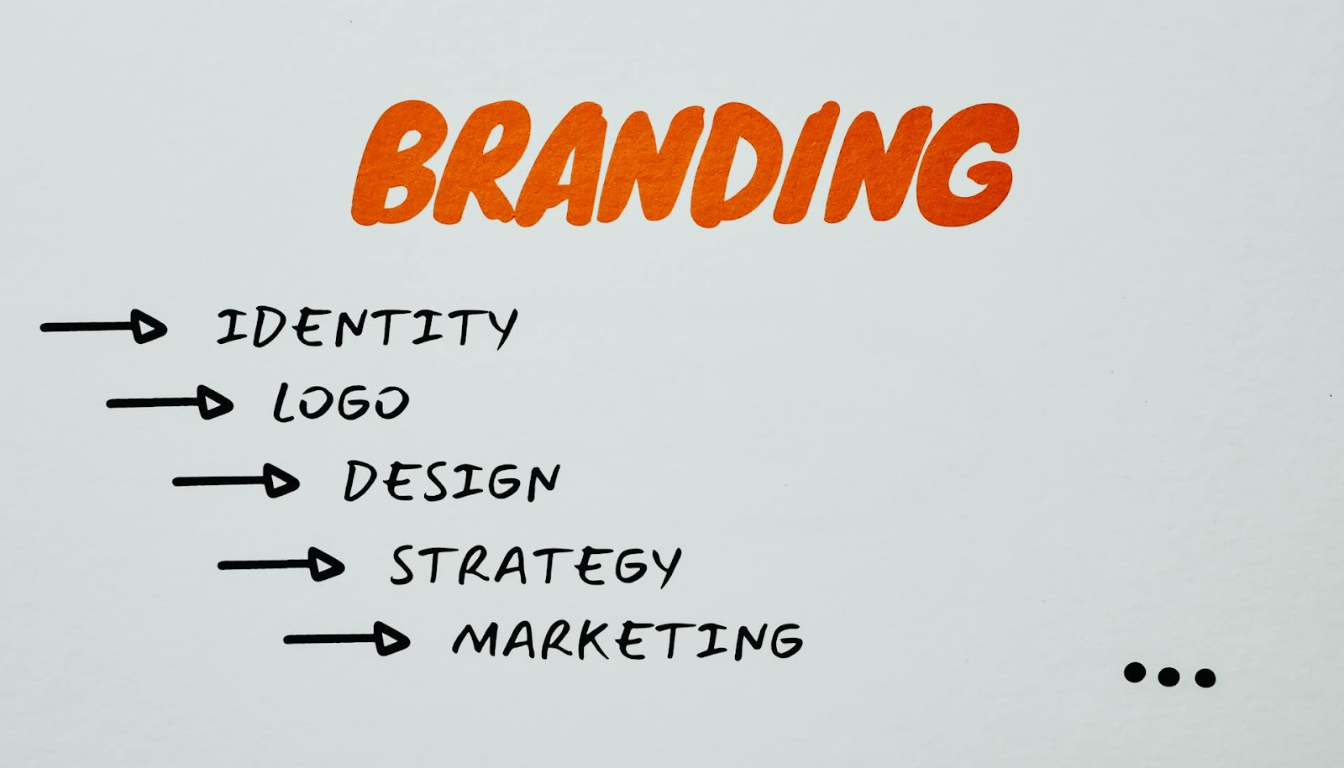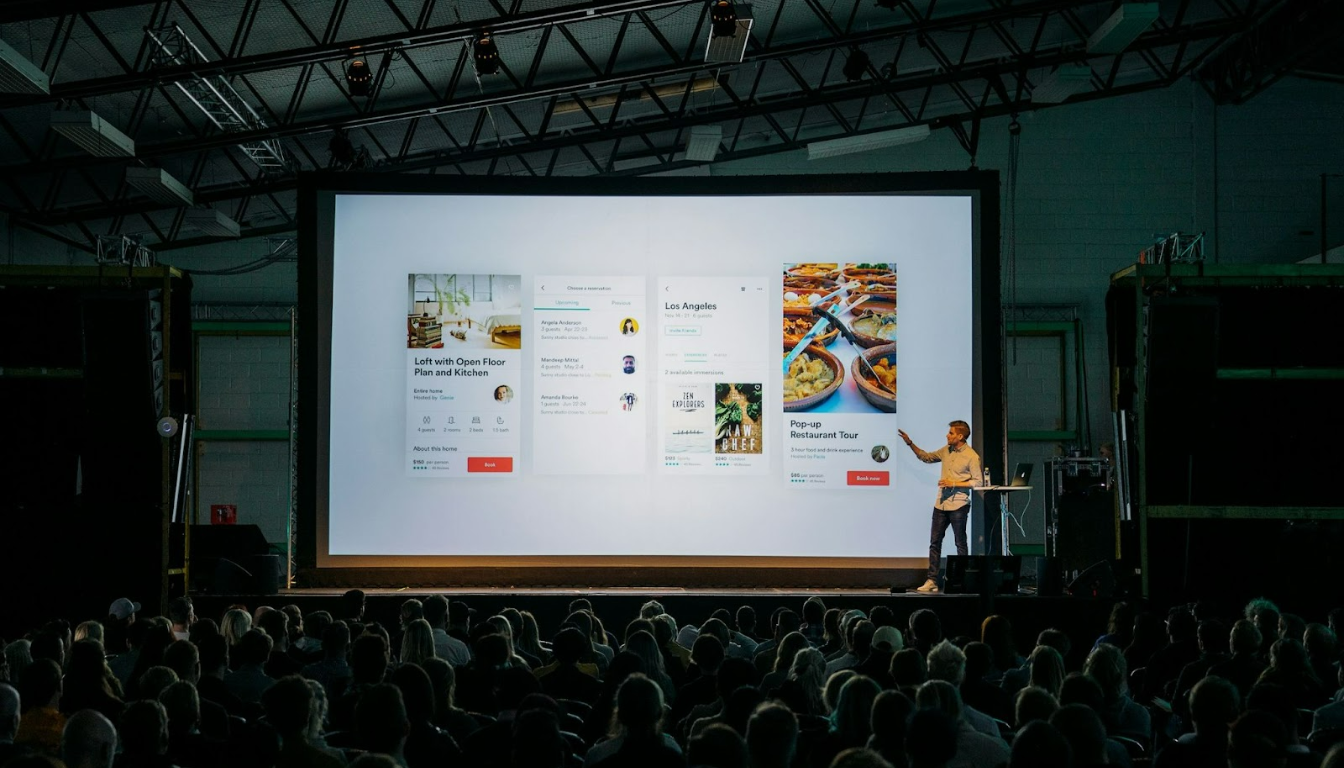Event Marketing: Top Strategies and Tips for Success in 2025

Curious about event marketing? It’s a powerful strategy to enhance your brand’s visibility and engagement. Learn how to make it work for you.
Key Takeaways
- Event marketing is essential for fostering authentic interactions, enhancing brand recognition, and driving customer engagement through face-to-face experiences.
- A successful event marketing strategy focuses on understanding the audience, aligning event goals with company objectives, and leveraging technology for improved engagement and ROI measurement.
- Emerging trends in event marketing, such as AI and augmented reality, are set to enhance participant experiences and create innovative event concepts that resonate with audiences.
Understanding Event Marketing

Event marketing is a promotional strategy designed to engage customers and prospects through face-to-face interactions at events. This approach stands out in the marketing world because it focuses on creating memorable experiences that resonate with attendees, fostering a deeper connection between brands and their audiences. Event marketers utilize this strategy to enhance their outreach and achieve their event marketing goals with effective promotional materials on their event marketing landing page, as outlined in this event marketing guide and on their event website.
The essence of event marketing lies in its ability to facilitate authentic interactions between brands and consumers. Unlike other marketing channels, events provide a unique opportunity to engage audiences in real-time, allowing for personalized experiences that are difficult to replicate through digital means. This personal touch is what makes event marketing so powerful and effective.
A successful event marketing strategy is all about creating unforgettable moments that connect people to a brand. Understanding what marketing events entail allows companies to strategically build lasting relationships and drive customer engagement. Whether it’s a product launch, a trade show, or a networking event, the goal is always to leave a lasting impression on the attendees.
As we dive deeper into the world of event marketing, we’ll explore the key benefits, different types of events, and how to develop an effective strategy. This guide will provide a comprehensive understanding of why event marketing is important and how it can transform your brand’s marketing efforts.
Key Benefits of Event Marketing

One of the most significant benefits of event marketing is its ability to boost brand recognition and customer loyalty. Participating in events allows brands to showcase their unique personality and establish credibility, crucial in today’s competitive market. This visibility not only attracts new customers but also reinforces the brand’s image among existing ones.
Event marketing also enhances customer engagement, providing a platform for businesses to interact with buyers in real-time. These face-to-face interactions foster deeper relationships, allowing companies to better understand their customers’ needs and preferences. This level of engagement is difficult to achieve through other marketing channels, making event marketing important and events a valuable opportunity for businesses. Additionally, analyzing event data can further improve these interactions.
Another key benefit is the ability to promote to a relevant audience and facilitate sales. When done correctly, event marketing allows companies to target specific demographics, ensuring that their marketing efforts reach the right people. This targeted approach not only improves the effectiveness of the marketing strategy but also maximizes the return on investment (ROI).
Identifying and reaching the right audience is essential to maximize the impact of event marketing. Tailoring the event to the attendees’ interests and preferences helps businesses create a unique and memorable experience that resonates with their audience. This personalized approach is what makes event marketing so effective in building brand awareness and driving customer engagement.
Types of Event Marketing
Event marketing encompasses a variety of event types, each with its unique advantages and challenges. These can be broadly categorized into in-person, virtual, and hybrid events. Understanding these different formats allows businesses to choose the right approach for their marketing goals and audience.
In-person events, such as trade shows and networking events, are excellent for fostering personal connections. These in person event provide:
- A tangible experience that helps build trust and engagement with the audience
- Opportunities for attendees to interact directly with the brand
- A memorable experience that strengthens brand loyalty and form in person connections
Virtual events, on the other hand, have the potential to engage a global audience. With the rise of digital platforms, events like webinars and virtual conferences have become increasingly popular. Successful examples, such as Marshmello’s concert in Fortnite, demonstrate the immense engagement potential of virtual events.
Hybrid events combine the best of both worlds, merging in-person and virtual elements to allow for both local and remote participation. This format is particularly effective in reaching a broader audience while still providing the personal touch of in-person interactions. Leveraging the strengths of both formats, hybrid events can maximize attendance and engagement.
Developing an Effective Event Marketing Strategy

Creating a successful event marketing strategy begins with:
- Understanding your target audience.
- Knowing who your potential attendees are and what they expect from the event.
- Segmenting the audience to ensure that the event appeals to the right people.
This is crucial for crafting a marketing channel message that resonates with them.
Aligning event and company goals ensures strategic coherence. The objectives of the event should support the broader business goals, such as:
- Increasing brand awareness
- Generating leads
- Boosting sales
Establishing clear KPIs is necessary to evaluate the success of the event against these defined goals.
An effective event marketing strategy should directly align with core KPIs. This alignment is essential for tracking performance and involves:
- Setting measurable targets for metrics such as event attendance, lead generation, and customer engagement.
- Continuously monitoring these metrics.
- Adjusting strategies based on the metrics to improve outcomes.
The event marketing plan should include detailed logistics, marketing strategies, and content tailored to the audience. This comprehensive approach ensures that every aspect of the event planning is well-planned and executed, maximizing the chances of success. From the initial planning stages to the event’s execution and post-event follow-up, a detailed strategy is crucial for achieving the desired results.
Leveraging Technology for Event Marketing

Technology plays a crucial role in event marketing in today’s digital world. Event management software streamlines various processes, including registration and post-event reporting, improving the overall event experience. This technology enhances operational efficiency, allowing event planners to focus on creating engaging experiences for attendees.
Live streaming is another powerful tool that allows for greater audience reach and interaction. By broadcasting live events online, businesses can engage with a global audience, increasing visibility and participation. This approach is particularly effective for virtual and hybrid events, where remote attendees can join in real-time during a live event.
Wearable technology and mobile apps provide valuable insights into attendee behavior and preferences. These tools allow event planners to collect data on how attendees interact with the event, enabling them to tailor the experience to better meet their needs. Additionally, contactless check-in technologies enhance convenience and safety, further improving attendee satisfaction.
Leveraging technology, businesses can enhance participant engagement and ensure the success of their event marketing strategy. From streamlining operations to providing personalized experiences, technology is a vital component of modern event marketing.
Creating Engaging Content for Events
Creating engaging content is essential for connecting with event attendees and enhancing their experience. Mobile apps provide attendees with schedules, networking options, push notifications, and engaging content, making it easier for them to participate and stay informed throughout the event.
Incorporating live streams and polls on social media can boost audience engagement while conducting live events provided attendees are happening. This real-time interaction encourages attendees to actively participate, creating a more dynamic and memorable experience. For example, Sonos created a sensory experience to promote its products, allowing attendees to engage with music in innovative ways that emphasized its sound technology.
Building anticipation for events is another key aspect of creating engaging content. Behind-the-scenes looks and speaker highlights can generate excitement and ensure a more engaged audience. This pre-event content helps to build a connection with attendees before they even arrive, setting the stage for a successful event.
Well-executed engaging content can greatly enhance the likelihood of event success by creating memorable experiences that resonate with attendees. Focusing on interactive and personalized content ensures that events leave a lasting impression.
Measuring Event ROI
Measuring event ROI is a critical component of any successful event marketing strategy. Event ROI can be calculated by comparing the net value gained from an event to the total investment made. This involves tracking various metrics, including:
- Revenue
- Registration rates
- Attendee engagement
- Sales qualified leads
Different ROI models can provide insights at varying complexities, from simple return on investment to more advanced incremental margin analysis. These models help businesses understand the financial impact of their events and identify areas for improvement. For instance, the incremental margin model provides a detailed view of event profitability by factoring in costs of goods sold.
Technology integration across event management platforms, CRMs, and marketing tools facilitates more accurate tracking of ROI. Using business intelligence tools helps marketers make sense of growing data volumes related to event performance. Event technology tools can enhance data access and simplify the process of measuring event-related data.
Effectively measuring event ROI ensures that event marketing efforts deliver the desired results. This data-driven approach allows for continuous improvement and optimization, ensuring the success of the right event and future events.
Post-Event Follow-Up Strategies
The work doesn’t end when the event is over. Effective post-event follow-up strategies are crucial for maximizing the impact of the event marketing strategy. Engagement at events allows businesses to create a pipeline of potential leads that can lead to future sales. Nurturing these leads and converting them into customers is a key component of a successful strategy.
Offering incentives can increase the response rate for a post event survey, encouraging valuable feedback. This feedback is essential for understanding what worked well and what can be improved for future events. Additionally, leveraging content generated during the event can help maintain engagement and attract future attendees.
Sales teams should:
- Follow up with event participants to provide relevant content and gather insights on their experience to generate leads.
- Monitor engagement data to prioritize follow-up with attendees who showed the most interest.
- Send personalized emails thanking attendees for their participation to engage attendees and foster a positive relationship within the sales pipeline.
Implementing effective post-event follow-up strategies ensures that events have a lasting impact and contribute to long-term success. This continuous engagement helps to build strong relationships with connecting attendees and encourages their participation in future events.
Maximizing Social Media Impact
Maximizing social media impact is essential for a successful event marketing strategy. By creating excitement and anticipation through sneak peek photos of event setups, businesses can engage potential attendees and build buzz around the event. Regularly updating social media with new content helps maintain visibility and keeps the audience engaged.
Behind-the-scenes content can be particularly effective in building anticipation for the event. Sharing the preparation work and giving a glimpse of what to expect can create a sense of excitement and curiosity among potential attendees. Live tweeting during events allows for real-time audience engagement and sharing of insights. This real-time interaction can enhance the event experience for both in-person and virtual attendees.
Using event-specific hashtags can significantly enhance awareness and engagement on social media. Hashtags help categorize content, increase discoverability, and facilitate audience engagement. Promoting events during their occurrence can create a fear of missing out (FOMO) for those not attending, encouraging them to participate in future events.
Social media interactions can foster community engagement and promote events before, during, and after they occur. Leveraging platforms like:
They help businesses:
- connect with a wider audience
- build brand awareness
- drive event attendance.
Event Sponsorships and Partnerships
Event sponsorships and partnerships play a vital role in enhancing the quality and success of events. Sponsorships provide financial or in-kind support, which can significantly improve the event experience for attendees. Incorporating sponsors into the marketing strategy enhances both the visibility and credibility of the event.
Companies look for sponsorship opportunities and marketing opportunities to improve brand visibility and connect with targeted audiences. Offering both cash and in-kind sponsorship options can appeal to a wider range of potential sponsors. Having a well-defined value proposition for sponsors can significantly enhance the likelihood of securing sponsorships.
Maintaining a professional online presence can instill confidence in potential sponsors and increase their willingness to invest. Creating a detailed sponsorship package helps sponsors visualize the benefits of supporting an event. Using data to demonstrate potential ROI makes your sponsorship pitch more compelling to prospective sponsors.
Engaging local businesses as sponsors can strengthen community ties and provide mutual benefits for both the event and many businesses. Post-event reports detailing sponsorship impact can help in building long-term relationships with sponsors, ensuring their continued support for future events.
Case Studies and Success Stories
Real-life examples of successful event marketing can provide valuable insights and inspiration. Twitter’s Beach at the Cannes Lions Festival effectively showcased its brand by incorporating trending pop culture into its event design, making a memorable impact on attendees. This creative approach helped Twitter connect with its audience on a deeper level.
Glamour Magazine and Fiat’s Beauty Festival attracted diverse audiences by offering beauty treatments and insights into industry trends, earning the nickname ‘Coachella of fashion’. This event demonstrated how combining entertainment and education can create a unique and engaging experience for attendees.
GE’s Minds + Machines event showcased a giant gas engine, illustrating how industrial companies can create engaging narratives around technology and innovation. This event successfully highlighted GE’s technological advancements and their impact on the industry, attracting current and prospective customers.
The Beat Beethoven 5k event encourages community participation by rewarding runners who finish before a specific symphony piece ends, combining fitness with cultural engagement. This event exemplifies how creative and interactive event concepts can attract and engage diverse audiences, creating memorable experiences.
Future Trends in Event Marketing

As we look to the future, several trends are set to shape the landscape of event marketing. AI technologies enhance event experiences by streamlining guest registration on the registration page and predicting crowd flow. This technology can improve operational efficiency and provide a more seamless experience for attendees.
Augmented and virtual reality are emerging trends that create immersive experiences for event attendees. Augmented reality can create virtual tours and interactive displays, allowing attendees to engage with the event in innovative ways. Virtual reality offers fully immersive experiences, transporting attendees to different environments and enhancing their engagement.
Integrating AI and augmented reality is set to significantly alter the landscape of event marketing in an increasingly digital world, enhancing engagement and experience. These technologies offer new opportunities for businesses to create unique and memorable experiences that resonate with their audience.
Staying updated with these trends and incorporating them into your event marketing strategy can help businesses stay ahead of the competition and continue to create impactful industry events. As the event industry evolves, embracing new technologies and innovative approaches will be key to achieving success.
Summary
Event marketing is a powerful tool for businesses looking to create memorable experiences and connect with their audiences. From boosting brand recognition and engagement to leveraging technology and creating engaging content, a successful event marketing strategy encompasses various elements that work together to achieve the desired outcomes.
Understanding the different types of events and developing a detailed strategy are crucial for maximizing the impact of event marketing. Platforms like Offsite can help organizations design and deliver impactful events by providing curated experiences and innovative solutions that strengthen audience engagement. Understanding the different types of events and developing a detailed strategy are crucial for maximizing the impact of event marketing. By measuring event ROI and implementing effective post-event follow-up strategies, businesses can ensure their events contribute to long-term success.
As we move forward, staying updated with future trends and incorporating new technologies will be essential for maintaining a competitive edge. By continuously adapting and innovating, businesses can create unforgettable events that leave a lasting impression on their audience.
FAQs
- What is event marketing?
Event marketing is a promotional strategy that fosters customer engagement through face-to-face interactions at events, aiming to create memorable experiences for attendees. This approach effectively builds connections and enhances brand loyalty.
- What are the key benefits of event marketing?
Event marketing boosts brand recognition and customer loyalty while enhancing engagement and promoting to a relevant audience, ultimately facilitating increased sales.
- What are the different types of event marketing?
Event marketing comprises in-person events, virtual events, and hybrid events, each offering distinct advantages for audience engagement. Choosing the right type depends on your target audience and marketing goals.
- What are some future trends in event marketing?
AI technologies and immersive experiences through augmented and virtual reality will significantly shape the future of event marketing, enabling more engaging interactions. Embracing these trends will be crucial for staying relevant in the evolving landscape.
You may also like
Unique spaces for your next offsite
Find distinctive venues for your upcoming corporate retreat.
Stay Updated with Our Insights
Get exclusive content and valuable updates directly to you.







